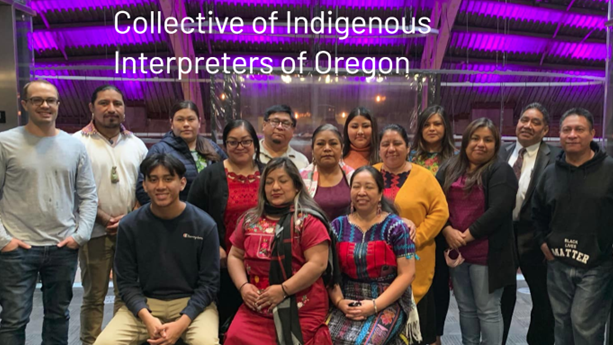
Pedro Sosa of AFSC (back row, fourth from left) is part of the Collective of Indigenous Interpreters of Oregon.
Alonso Oliveros of AFSC recently detailed these 2025 legislative wins in Oregon for immigrant rights:
1. $15 million for Universal Legal Representation to help detained community members without status to access lawyers to mitigate or stop deportation proceedings
2. $2 million for the Farmworker Disaster Relief Fund
3. $750,000 for Indigenous Language Justice to facilitate access to interpretation services for indigenous speaking communities
4. Partial investment in the Home Fund to provide rental assistance for working families
Pedro Sosa of AFSC shares about AFSC’s role in these accomplishments.
How did AFSC help in these legislative victories?
One of the things we’ve been doing is working with the Collective of Indigenous Interpreters of Oregon.
The project is run by Pueblo Unido PDX. AFSC Oregon supports their efforts in lobbying and educating the community.
I’ve been doing Kʼicheʼ-to-Spanish translation for at least 15 years, even before the Collective began eight years ago. Before that, I did interpretation but couldn’t get paid because of my immigration status at the time. We did it to support the community.
Finally, a group of us indigenous people came together to look at the needs in our community. Mostly we realized that during the pandemic, many indigenous people did not get help from the Oregon Worker Relief fund. Language was a big barrier. That’s where I was involved more deeply – doing a Facebook Live in Kʼiche’ about the Worker Relief fund.
Also, AFSC has been doing Know Your Rights (KYR) trainings in Kʼicheʼ for the community and helping people when they have appointments with lawyers. So the community knows we have someone at AFSC who can speak Kʼicheʼ.
They call us and ask the questions about immigration. That’s the importance of my involvement in this group. We participate in the meetings and lobbying. The indigenous interpreters were not paid until this legislation passed.
The government was asking for credentials to be an interpreter. But we don’t have that kind of documentation to prove we are interpreters. Until now, we couldn’t technically do interpretation in the courts. But sometimes there’s no choice for the judges.
Now we are working with Pueblo Unido, and they’re researching in Guatemala and the US regarding Kʼicheʼ and three or four other languages. In Guatemala, there are 23 languages spoken. Just three indigenous languages in the US are being researched as a base.
There’s an organization that provides these interpreter credentials for 100 languages around the world. They provide these credentials after completing a process, and they can then be recognized by the courts.
But for indigenous peoples right now, we don’t have that.
During this most recent legislative session, did you talk with lawmakers?
Yes we did, and that’s why we got this funding. We shared our experiences and challenges as interpreters – and also the challenges the communities face when they need interpretation but no one can pay the interpreters.
That’s why this money recognizes the time interpreters put in. It’s sporadic when the court asks for help with interpretation.
Regarding the other three legislative wins, did AFSC Oregon work on those?
Yes, we supported as AFSC because it’s part of the legal aspect of our work – not only KYR, but also support for immigrants who are detained by ICE.
And many people – because of the barriers around money, they can’t have legal representation. But with this help, they can start legal cases. It’s very important and linked to the work we do. It’s why we support by lobbying and educating the community.
Before this $15M was allocated for Universal Legal Representation, was there anything in the fund?
We had the fund before that. We’ve had it for a few years – universal representation. It started more during the pandemic, along with the Oregon Worker Relief fund.
And we’ve seen the impact of the disasters such as the wildfires. Many people were displaced because they were close to the fires.
During the pandemic, undocumented workers didn’t have access to relief. That’s why we worked with lawyers to support the campesinos – the farm workers.
When you’re talking with state lawmakers, are they sympathetic? Do they care? How do you help them understand the importance of these issues?
Some people you can’t even get an appointment with. But we identified the people who are friendly with the community, trying to meet with them and share our stories. Not only about the wildfires, but also the winters. Remember the ice storms a few years back and the many trees that fell?
That’s where this fund helped the farmworkers. All is related with what we do. We work with campesinos doing Know Your Rights. That’s another way we have a presence as AFSC.
During the pandemic, our Rapid Response (RR) Team was mobilized to help immigrants. When the pandemic started, we didn’t know what to do with the RR team. That’s when people agreed – our RR team is not just to address ICE, but also to support whatever the community needs.
And back then there were no masks in the stores. And the community started making masks. That’s part of the process of organizing the community to respond to the crises the community is facing.
All of this is very important. When we go into the farm fields, we need to speak in Kʼicheʼ with the community that speaks Kʼicheʼ. That’s their first language. But there are lots of other communities that don’t have the opportunity to be spoken to in their own language.
I’m lucky to be part of that, to communicate with the community about resources, to share what they can do, and to support them.